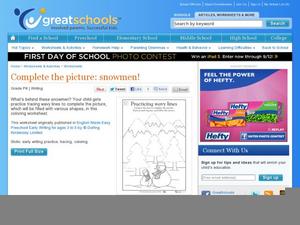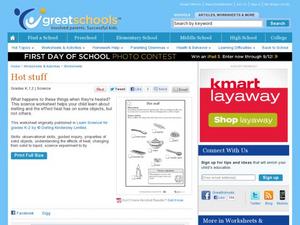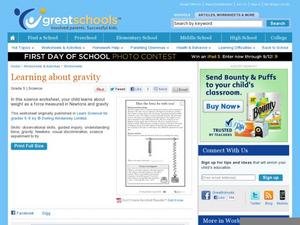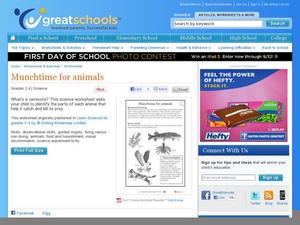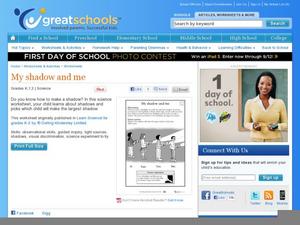Curated OER
Multiples of 6 #2
Count by six with these helpful activities. After completing number sequences and multiplication problems from the six times table, third graders solve problems that are written out at the bottom of the page. An excellent way to work on...
Curated OER
Place Value for Decimals
Are your fourth graders having problems with decimals? Help them identify the place value of various numbers. Here, they describe what happens to the value of different numbers, as well as select numbers with given values in the tenths...
DK Publishing
Real-Life Problems: Miles, Pounds, and More
Give young arithmeticians an applicable way to use their addition and subtraction skills with these five word problems. Each one presents a scenario requiring they add or subtract numbers with units (money, distance, weight,...
DK Publishing
Subtraction Practice #3
Reinforce subtraction skills with twenty problems, all subtracting two-digit numbers from three-digit numbers. An additional five problems at the end of the page include decimals to the hundredth place. Great as a homework assignment or...
Curated OER
Complete the Picture: Snowmen!
Finish the winter wonderland with your preschoolers. They trace pine trees and the tops of mountains to complete the snowy drawing. Have them color their paper and display the drawings during a winter unit!
Curated OER
Contractions
Shorten words with contractions. Second graders use apostrophes to shorten words, including harder ones like might not. Next, they write out the longer versions of various contractions. Have them write a story with these contractions for...
Curated OER
Days of the Week
Cover both capitalization and the days of the week with a great kindergarten activity! Kids read each day of the week out loud, then write the name of the day on a line. They answer three questions about certain days of the week,...
Curated OER
Poems: calligrams
Have fun with shape poems! First and second graders write calligrams that add to the meaning of their poems. Great for your poetry unit or if you want to combine poetry and art lessons.
Curated OER
A Whale of a Story
Does sound travel faster in water or in the air? Put the question to the test with a science experiment. After reviewing a table of data, third and fourth graders decide which statements are true and which ones are false. The bottom of...
Curated OER
Bend It! Stretch It! Squash It!
Some items keep their shape no matter what happens! Have your kindergarten class choose which items would stay the same if they were bent, stretched, or squashed. The last activity prompts kids to see what happens when they stretch a...
Curated OER
Feel the Vibrations
How does sound travel in a string walkie-talkie? Third graders read about the way vibrations act between two cups and a string. Next, they put the steps in order, and experiment with their own walkie-talkies.
Curated OER
Food chains at sea
Fifth graders interpret a table of data about food chains in the ocean. They create a food chain to represent the information on the table. Periwinkles eat seaweed, and crabs eat periwinkles - so who eats crabs? Extend the activity with...
Curated OER
Getting nosy
A nose knows! Connect animals to their noses with a fun science activity. Animals include elephants, rats, pigs, and even humans. For a science exploration, kindergartners answer questions about what they can smell. A great addition to...
Curated OER
Hot Stuff
Very young scientists who are learning about solids, liquids, melting, and freezing will use this learning exercise to identify things that would melt if put in a warm place. There are eight objects altogether, and learners place a check...
Curated OER
How Light Can "Bend"
Examine the properties of light with a fifth grade science experiment. Pupils find out how light bounces off the surface of a mirror, as well as how a periscope works. For the science investigation part, kids build their own periscope...
Curated OER
How Soluble Is It?
Is sugar more soluble than salt? Experiment with water and solubility with an elementary science activity. After interpreting data from a bar chart, fifth graders use different types of sugar to determine if the size of sugar particles...
Curated OER
Learning about gravity
Learn how to measure weight with newtons in a science experiment about gravity. After they read a short paragraph about force, fifth graders draw an arrow to indicate which way a spring is being pulled. Next, they survey their family...
Curated OER
Munchtime for animals
Which animals eat meat to stay alive? Third graders group fish, hawks, and cats into carnivores and herbivores. An extended activity prompts kids to cut out magazine pictures of different animals according to the foods that they eat.
Curated OER
Name That Critter
Young learners classify five different animals into their proper category. The animals pictured are a pigeon, a lizard, a cat, a frog, and a goldfish. Pupils are also asked to tell why they know it's a certain kind of animal. An...
Curated OER
My Shadow and Me
Practice making shadows with a kindergarten science experiment. After deciding which picture would represent the biggest shadow, kids use a flashlight to experiment with their own shadows. For extra fun, have kids mark their shadows...
Curated OER
Night Here, Day There
Explore astronomy with a lab sheet for fifth grade scientists. After reading a short explanation about the earth's rotation, they solve a word problem about the differences in times across the world. Next, they make a model of the solar...
Curated OER
Plants have needs, too!
Plants can die if they don't get enough sunlight and water. Kindergartners observe a picture of a hanging plant and grass under a tree, and interpret which each plant has died. Next, they grow watercress seeds in wet cotton to compare...
Curated OER
Ring-A-Ding-Ding!
What sound does metal make when you hit it? Kindergartners and first graders conduct an experiment about the properties of metal. First, they draw a line between metal items and descriptions of each. Next, they use a magnet to see which...
Curated OER
Le cigale et la fourmi
Explore French literature by reading the short poem "La cigale et la fourmi." On the second page, there's a literal translation of the poem (into English), but consider having your learners try to translate it on their own before showing...
Other popular searches
- Summer Math
- Summer Activities
- Home School Summer
- Summer of the Monkeys
- Summer Solstice
- Summer Olympics
- Summer Safety
- Summer Reading Projects
- All Summer in a Day
- Summer Jobs
- Foreign Languages Summer
- Summer Vacation






